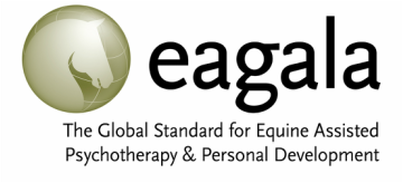EAGALA Model
Founded in 1999, EAGALA stands for the Equine Assisted Growth And Learning Association. It is the structure and standard for certifying Equine Specialists and Mental Health Professionals to provide Equine Assisted Psychotherapy and Learning worldwide. There are over 4,500 members in 50 countries.
|
The EAGALA Model of Equine Assisted Psychotherapy & Learning is based upon the following key theoretical tenets: CBT, Reality Therapy, Gestalt Therapy, Brief Therapy, and Systems Therapy. During each session each therapy is utilized to create a deliberate activity to allow clients to get the maximum growth and learning from each session. Every EAGALA session always encompasses the following:
|
|
A Team Approach:
A licensed Mental Health Professional, a certified Equine Specialist, along with a herd of horses, work together with participants in all sessions. Focused on the Ground: There is no riding or horsemanship. All activities with the horses are unmounted. Participants are given specific and deliberate activities with the horses on the ground, based on the treatment goals. The interaction becomes a metaphorical learning system. |
Solution-Oriented:
The EAGALA Model firmly believes that the participants have solutions to all their issues and questions if they are given the opportunity to discover them. Code of Ethics: EAGALA has a strict code of ethics that providers are bound by. EAGALA also has a board of ethics which upholds and enforces these ethical standards. Each team also upholds ethical standards to the state, ensuring best practice. |
EAGALA is the only association offering a fully-developed and professionally endorsed treatment model for mental health professionals practicing Equine Assisted Psychotherapy.
With 20 years in the field, the EAGALA Model is tested and subject to ongoing research. EAGALA is committed to building a body of evidence-based, peer-reviewed research. EAGALA is recognized by the American Psychological Association, the American Counselors Association, and the National Association of Alcoholism & Drug Abuse Counselors. To learn more about EAGALA and review published research, please visit www.eagala.org.


